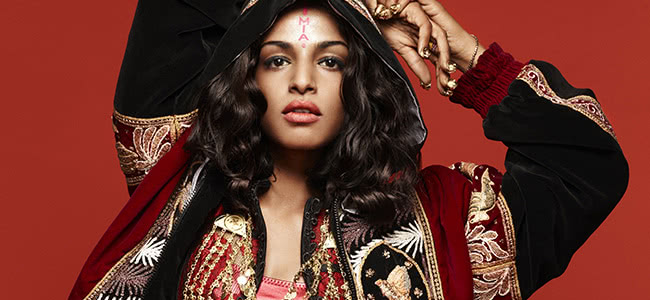Not only is M.I.A. no stranger to controversy, she’s openly embraced it. However, the people around the outspoken rapper apparently aren’t as keen to make headlines – they’ve pulled her latest music video before it can even draw criticism.
As The Independent reports, M.I.A. recently took to Twitter to complain that the release of her new music video is being blocked because of concerns of “cultural appropriation”. The video, she writes, was shot in Côte d’Ivoire with a local dancer.
“I wanna talk about clutrural appropriation!” the Sri Lankan-born rapper wrote on Twitter. “I’ve been told I can’t put out a video because it’s shot in Africa. Discuss. What happens when I shoot videos in America or Germany it makes no sense to the 00.01% of artists like me.”
While M.I.A., real name Mathangi “Maya” Arulpragasam, did not specify just who was halting the release of the video, nor which song the clip was for, many have begun to speculate that the rapper’s label, Interscope, is behind the ban.
According to Arulpragasam, the video in question is a one-take shot of a dancer, presumably from the region where the clip was filmed, whom she describes as “the best in the wide world”, insisting that viewers wouldn’t get to see such a performer on a televised talent show.
“If the music industry allows an African artist to come through this year on [international] level,” Arulpragasam continued, “I would gladly give him this video for free.” “Fingers crossed emoji. Holding breath emoji,” she added shortly after.
Arulpragasam stated that it took her two years to locate the anonymous dancer featured in the clip, before retweeting the reactions of several followers, several of whom suggested that releasing the clip would be a positive move towards opening a dialogue about cultural appropriation.
[include_post id=”448226″]
As the AV Club notes, since the video hasn’t been released and potentially never will be, it’s impossible to know if this is a case of M.I.A.’s label and/or management being extra cautious or if the video is really likely to cause offence.
Arulpragasam faced similar accusations back in 2012 following the release of her video for ‘Bad Girls’. The clip sparked controversy and accusations of appropriating Middle Eastern culture as it featured veil-clad women holding machine guns, smouldering oil tankers, and young men dressed in keffiyeh.
Earlier this month, Arulpragasam shared a demo for a new song titled ‘Platforms’. The song, which was uploaded to her official SoundCloud account, was subsequently removed. It’s not known if this was the song accompanying her new music video.
I wanna talk about clutrural appropriation! I've been told I can't put out a video because it's shot in Africa. Discuss
— M.I.A (@MIAuniverse) May 18, 2015
What happens when I shoot videos in America or Germany it makes no sense to the 00.01% of artists like me.
— M.I.A (@MIAuniverse) May 18, 2015
The video is 1 take shot of a dancer ! The best in the wide world! And he wasn't ever gonna make "_____got talent"
— M.I.A (@MIAuniverse) May 18, 2015
If the music industry allows an African artist to come through this year on intnl level, I would gladly give him this video for free.
— M.I.A (@MIAuniverse) May 18, 2015
Fingers crossed emoji
Holding breath emoji
— M.I.A (@MIAuniverse) May 18, 2015
The video was shot in http://t.co/Zb1lRad8yq . Took me 2 years to locate him
— M.I.A (@MIAuniverse) May 18, 2015




































